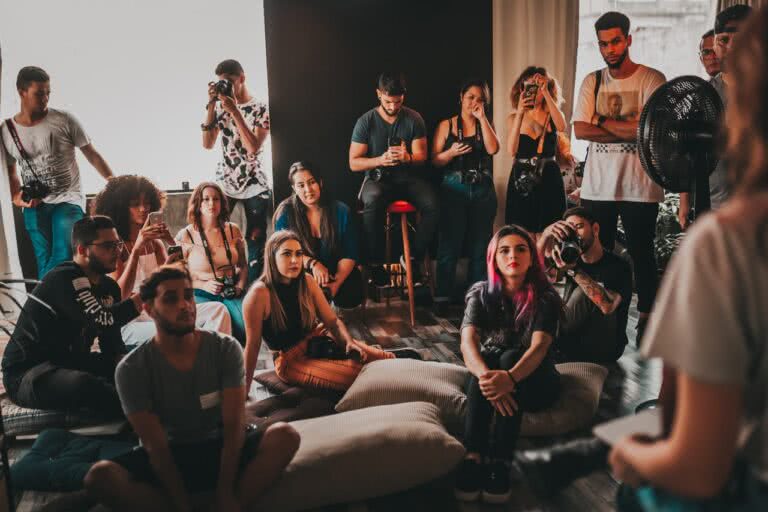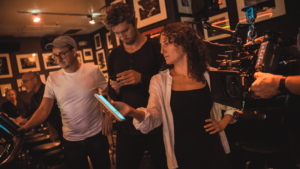Living in a world that’s rich in diversity is a cause for celebration. Recognising the cultural values and identity of your customers also helps people feel valued – and makes great business sense. Maybe you’re a new creator. Maybe you’ve organised a retail event before, but now you’re looking for new in-store event ideas. Either way, cultural events can help you attract new customers, build relationships with your local community, and have a lot of fun.
To feel connected to your business, your customers need to believe that it speaks directly to them. Ask yourself: what value does your business have to those you want to attract? What will motivate them to buy your product? Your retail event ideas, and virtual and in-store event marketing strategies, need to align with these values. Find out as much as you can about these potential customers and be clear about what’s important to them. Getting to know your local and virtual communities is the best way to convert them into customers.
In-person events are one way to bring people together, but let’s not forget that COVID-19 is still a challenge. Online cultural events provide a level of flexibility should circumstances change and are a good way of keeping your customers safe.
Why retailers should be celebrating culture
Celebrating culture lets your business show its personal side and makes people feel they belong in your store. Here are a few reasons why all retailers should be hosting cultural events:
- Expanding your market: Online cultural events are a brilliant way to extend your geographical reach. Providing a fast and efficient service for virtual attendees ensures no one is excluded. Focusing the event around specific cultural themes means people are more likely to share information with their families and friends. You could end up with a whole new fan base that had not previously identified with your business.
- Building community: One of the most beneficial elements of retail cultural events is they help unite people. Involving and engaging people brings them together and builds community. Organising a community event involves and engages people. If your event can achieve that, people will view your business positively and come back for more.
- Increasing foot traffic: To get customers spending, you need to get them through the door – be that in person or virtually. Retail cultural events are an excellent way to make your business look more interesting. People may not have previously identified with the cultural aspects of your event, but make it attractive enough and they will be drawn in.
- Showcasing your brand: The best retail event ideas are about showcasing your brand. Include a cultural angle, and you’re adding another string to your bow. You may even learn about new uses for your products or new ways in which they meet the needs of your customers. Like-minded consumers can strengthen affinity to your brand.
- Supporting local business: Since the onset of COVID-19, many community businesses have increasingly supported each other. Maybe you know of a local business that already has good links with specific cultural groups. Finding another business that can share the load and mutually reap the benefits is a win-win situation.
- Sponsorship: Partnering with a sponsor makes a lot of sense. They can support with advertising and promotion, and in return, you can help raise their profile. A pop-up store event or book store events are just a couple of ways in which sponsors can get on board. Look for sponsors who make sense to your brand, resonate with your customers, and already have a strong following.
Spotlight on creators
We can learn a lot from looking at other creators and the events they’re hosting. Big ideas can always be adapted to suit the size of your business. Here are a few examples of businesses that are getting it right:
Waterstones
Waterstones is the UK’s leading specialist book retailer. Every year it holds thousands of events and activities across its stores, ranging from events with first-time published authors to some of the biggest celebrities in the UK. As well as book signings, it hosts book launches – Harry Potter to name just one – and audiences with big names like Dame Helen Mirren and Ian McEwan. It’s also associated with 15 different literary festivals, including the world-renowned Cheltenham Literary Festival. It uses all of these events to deliver brand experience and develop a community of book lovers who are loyal to Waterstones.
Waitrose
Adapting to the COVID-19 pandemic, the supermarket chain Waitrose moved many of its in-person events online. Having a clear idea of what its customers wanted, it focused on interest areas like food, drink, and beauty. Virtual events included alcohol masterclasses, fashion talks by its sister company John Lewis, and virtual cooking classes. Sending participants product packages before the event helped replicate the in-home experience. Each event included a Q&A session, and results were used to better tailor the events. Drink events alone attracted over 12,000 customers.
TOAST
TOAST is a fashion brand that has built a loyal customer base by uniting people who are looking for a sustainable way of life. It has shops throughout the UK and an in-store presence in the US and Europe. Each season, TOAST brings together like-minded people through a series of events, talks, and workshops. These cover topics like wreath-making, leatherwork demonstrations, calligraphy workshops, and live folk music. It also hosts live shows each week, bringing people together through a series of styling conversations, talks with other makers, and guided tutorials.
Inspirational retail event ideas
There are many excellent ideas out there for cultural events. The key is to design an event with your customers specifically in mind. Whether you’re planning black cultural events, an event for expats, or events to attract new parents, your ideas need to be adapted to suit your market.
When thinking about who you’re aiming your event at, it can help to ask yourself a few questions. Am I focused on only one community? Who exactly am I trying to reach? What are their shared beliefs, interests, or hobbies? Do people live locally, regionally, nationally? How old are they? Are they defined by demographics such as gender, sexuality, or ethnicity? Are there any access challenges I will need to overcome? Making your event as relatable and accessible as possible increases your chance of success. Draw up a checklist to make sure you don’t miss anything.
Now you’re ready to get creative, here are a few ideas to get you started:
- Food sampling events: These are always popular. Focus on high-quality samples, great visuals, and a fun atmosphere. Have lots of tasty samples that tie in beautifully with your theme, and send out the recipe and ingredient lists so that people at home can be included. Finding the right person to give a demonstration is important too. The real benefit of an event like this is you can promote your products, keep people engaged and entertained, and provide a memorable experience.
- Drink-making classes: Similar to the food sampling events, drink and cocktail-making classes always go down well. Think wine tasting, mixology, or sampling artisan gin. But it doesn’t all have to be about alcohol. Why not choose smoothies, health drinks, or flavoured teas? Again, involve virtual attendees with recipe lists and ingredients and connect your event to products and services you provide in-store.
- Craft workshops: These have long been a pillar of community building. Go down the traditional route with knitting, basket weaving, or homemade cards, or branch out into origami, henna designs, or scented candles. As always, provide your virtual guests with everything they need to join in and, if possible, recruit a local expert to lend a hand. People love learning a new skill, and it gives you something to build on in future events.
- Bookclub/author reading: Books are the perfect medium to bring people together. Chosen carefully, they can not only promote your business but help people feel connected. Choose themes and authors that interest your audience. Some people will come for the cultural element of your event and others because they like the author. Advertise through community newsletters and groups to generate lots of interest. Providing drinks and nibbles that complement your theme can be an enticing addition. A plate of tapas or glass of sangría with a book about Spain? Perfect.
- Holiday celebrations: Basing your event around cultural holidays or festivals can give it context. Whether it’s Ramadan, Eid, Chinese New Year, Diwali, Black History Month, or Christmas, focus on your customer and your brand. Cultural festivals are steeped in tradition, which can make it easier when thinking about food, drink, and decorations. Local communities might not have previously associated your business with their festival, but they will be taking note now. Involving community leaders or prominent local figures can give you authenticity, too.
- Make-up classes and DIY: If you sell beauty or skincare products, make-up demonstrations are a great way to showcase your brands. Invite other local businesses like beauticians or hairstylists to come onboard. You could even include a fashion show featuring people from the local community. Samples and products can also be sent to virtual attendees to get them talking. Plan an event that aligns with your products but doesn’t push them – no hard sell makes your customers feel comfortable and positive about your business.
- Product launch party: If you have a product that particularly suits a cultural event or celebration, why not throw a launch party? Put up decorations and posters and create a buzz. The benefit of enticing people through the door with freebies, drinks, or snacks is that once they are in, you get to showcase your other products too.
Start planning your retail cultural event now
For your business to be successful, you need to have a strong relationship with your existing customers while finding new and innovative ways to expand your customer base. That means identifying and meeting the needs of not just those who walk through the door but also those who interact with you online. The key is to find exciting ways to get people engaged while keeping them safe.
Celebrating culture is a wonderful way of making your business part of something greater. Adopting this community angle can raise your visibility and give you a clear focal point for your event. Connecting with existing customers and gaining the allegiance of new customers means they’ll become important advocates for your business.
Eventbrite can help you to get started. Use our full suite of tools, tips, and resources to create the perfect cultural event, giving you the time to focus on bringing communities together.





